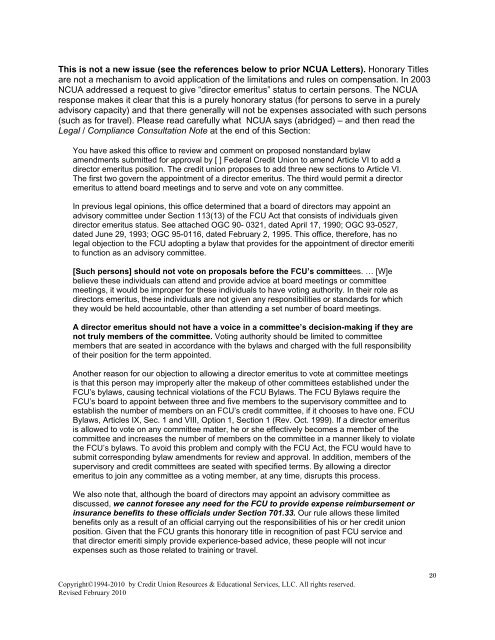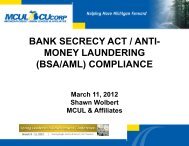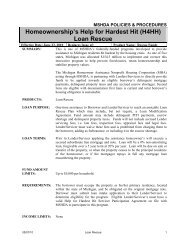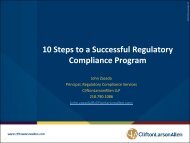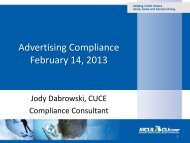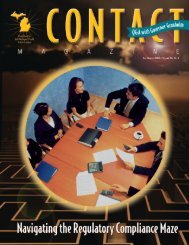regulatory and compliance issues and considerations
regulatory and compliance issues and considerations
regulatory and compliance issues and considerations
You also want an ePaper? Increase the reach of your titles
YUMPU automatically turns print PDFs into web optimized ePapers that Google loves.
This is not a new issue (see the references below to prior NCUA Letters). Honorary Titles<br />
are not a mechanism to avoid application of the limitations <strong>and</strong> rules on compensation. In 2003<br />
NCUA addressed a request to give “director emeritus” status to certain persons. The NCUA<br />
response makes it clear that this is a purely honorary status (for persons to serve in a purely<br />
advisory capacity) <strong>and</strong> that there generally will not be expenses associated with such persons<br />
(such as for travel). Please read carefully what NCUA says (abridged) – <strong>and</strong> then read the<br />
Legal / Compliance Consultation Note at the end of this Section:<br />
You have asked this office to review <strong>and</strong> comment on proposed nonst<strong>and</strong>ard bylaw<br />
amendments submitted for approval by [ ] Federal Credit Union to amend Article VI to add a<br />
director emeritus position. The credit union proposes to add three new sections to Article VI.<br />
The first two govern the appointment of a director emeritus. The third would permit a director<br />
emeritus to attend board meetings <strong>and</strong> to serve <strong>and</strong> vote on any committee.<br />
In previous legal opinions, this office determined that a board of directors may appoint an<br />
advisory committee under Section 113(13) of the FCU Act that consists of individuals given<br />
director emeritus status. See attached OGC 90- 0321, dated April 17, 1990; OGC 93-0527,<br />
dated June 29, 1993; OGC 95-0116, dated February 2, 1995. This office, therefore, has no<br />
legal objection to the FCU adopting a bylaw that provides for the appointment of director emeriti<br />
to function as an advisory committee.<br />
[Such persons] should not vote on proposals before the FCU’s committees. … [W]e<br />
believe these individuals can attend <strong>and</strong> provide advice at board meetings or committee<br />
meetings, it would be improper for these individuals to have voting authority. In their role as<br />
directors emeritus, these individuals are not given any responsibilities or st<strong>and</strong>ards for which<br />
they would be held accountable, other than attending a set number of board meetings.<br />
A director emeritus should not have a voice in a committee’s decision-making if they are<br />
not truly members of the committee. Voting authority should be limited to committee<br />
members that are seated in accordance with the bylaws <strong>and</strong> charged with the full responsibility<br />
of their position for the term appointed.<br />
Another reason for our objection to allowing a director emeritus to vote at committee meetings<br />
is that this person may improperly alter the makeup of other committees established under the<br />
FCU’s bylaws, causing technical violations of the FCU Bylaws. The FCU Bylaws require the<br />
FCU’s board to appoint between three <strong>and</strong> five members to the supervisory committee <strong>and</strong> to<br />
establish the number of members on an FCU’s credit committee, if it chooses to have one. FCU<br />
Bylaws, Articles IX, Sec. 1 <strong>and</strong> VIII, Option 1, Section 1 (Rev. Oct. 1999). If a director emeritus<br />
is allowed to vote on any committee matter, he or she effectively becomes a member of the<br />
committee <strong>and</strong> increases the number of members on the committee in a manner likely to violate<br />
the FCU’s bylaws. To avoid this problem <strong>and</strong> comply with the FCU Act, the FCU would have to<br />
submit corresponding bylaw amendments for review <strong>and</strong> approval. In addition, members of the<br />
supervisory <strong>and</strong> credit committees are seated with specified terms. By allowing a director<br />
emeritus to join any committee as a voting member, at any time, disrupts this process.<br />
We also note that, although the board of directors may appoint an advisory committee as<br />
discussed, we cannot foresee any need for the FCU to provide expense reimbursement or<br />
insurance benefits to these officials under Section 701.33. Our rule allows these limited<br />
benefits only as a result of an official carrying out the responsibilities of his or her credit union<br />
position. Given that the FCU grants this honorary title in recognition of past FCU service <strong>and</strong><br />
that director emeriti simply provide experience-based advice, these people will not incur<br />
expenses such as those related to training or travel.<br />
Copyright©1994-2010 by Credit Union Resources & Educational Services, LLC. All rights reserved.<br />
Revised February 2010<br />
20


